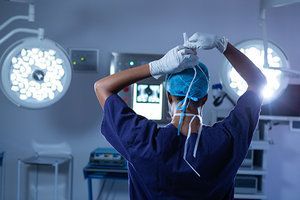One of the longest nerves in the body is known as the vagus nerve (VN). The VN is the 10th pair of cranial nerves that originates at the brain stem in the medulla oblongata. This nerve is part of the parasympathetic nervous system, which is a part of the ANS. Research suggests ear acupuncture can activate the VN.
Acupuncture: A Great Choice Prior to Surgery
Medication, including opioids, is commonly prescribed following surgery; and many veterans deal with chronic pain with opioids, independent of surgery. Exciting new research suggests veteran surgical candidates who receive acupuncture prior to their procedure experience less postsurgical pain and are less likely to require opioids – a win-win for both veterans and the acupuncture profession.
Study findings presented at the annual meeting of the American Society of Anesthesiologists (ASA), and subsequently detailed in an ASA press release, detailed the encouraging results involving more than 100 veterans randomly assigned to one of two groups prior to surgery.
In the first group, patients scheduled to undergo hip replacement received either traditional acupuncture (21 patients) or served as controls (also 21 patients). In the second group, patients scheduled to undergo one of several surgeries (gallbladder removal, hernia repair, etc.) received battlefield acupuncture (28 patients) or served as controls (36 patients). The press release did not specify when vets received acupuncture (i.e., how long before surgery).

In group #1, acupuncture recipients required nearly three times less morphine in the first 24 hours after surgery compared to controls. They also reported higher satisfaction scores regarding pain management, less pain and less anxiety than controls.
In group #2, patients receiving battlefield acupuncture required half the opioids 24 hours post-surgery compared to controls; and also had significantly lower pain scores, higher satisfaction scores, and reported minimal nausea / vomiting post-procedure (only 3 percent vs. 38 percent of controls).
The press release includes a great quote from lead study author Brinda Krish, DO, an anesthesiology resident at Detroit Medical Center: "Clearly it is crucial to have multiple options for treating pain, and acupuncture is an excellent alternative. It is safe, cost effective and it works."



